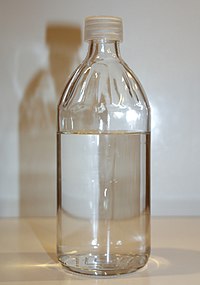
Photo from wikipedia
OBJECTIVE Dermatophytes are resistant to some available antibiotics. Development of new plant drugs to control drug resistant microbes is urgently needed. This study evaluates the antidermatophytic potential of 18 selected… Click to show full abstract
OBJECTIVE Dermatophytes are resistant to some available antibiotics. Development of new plant drugs to control drug resistant microbes is urgently needed. This study evaluates the antidermatophytic potential of 18 selected medicinal plants used by traditional healers in Theni and Virudhunagar Districts of Tamil Nadu, India. MATERIALS AND METHODS Selected plant parts were collected, shade dried and powdered. Plant powders were extracted with ethanol and their antifungal potency was investigated against and clinical dermatophytes. The antioxidant effect of the extracts was screened using DPPH assay. Minimal Inhibitory Concentration (MIC) and Minimal Fungicidal Concentration (MFC) were estimated for the extracts. Ten plant extracts showed maximum MFC and they were selected to study their efficacy in interfering with ergosterol biosynthesis. Fluconazole-35μg/mL known fungicide was used as control. The most active extracts were taken for biocompatibility studies using 3T3-L1 fibroblast cell lines. RESULTS The ethanol extract of Phyllanthus reticulates leaves showed good antifungal activity compared to other plant extracts. The MIC and MFC for Phyllanthus reticulatus were 62.5 and 250μg/mL against M. pachydermatitis and T. rubrum respectively. The ethanol extracts of Phyllanthus reticulatus, Coldenia procumbens, Thespesia populnea and Senna alata significantly lowered the release of ergosterol by 16.37, 19.53, 24.79, and 21.44%, respectively. The ethanol extract of Phyllanthus reticulatus leaves was more biocompatible to host cells than other active extracts. CONCLUSION Our study indicated that the ethanol extract of Phyllanthus reticulates leaves showed promising activity against dermatophytes. It could be a potential material for future development of antidermatophytic agents.
Journal Title: Journal de mycologie medicale
Year Published: 2018
Link to full text (if available)
Share on Social Media: Sign Up to like & get
recommendations!